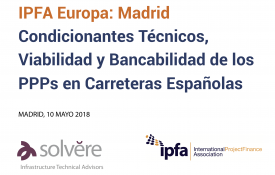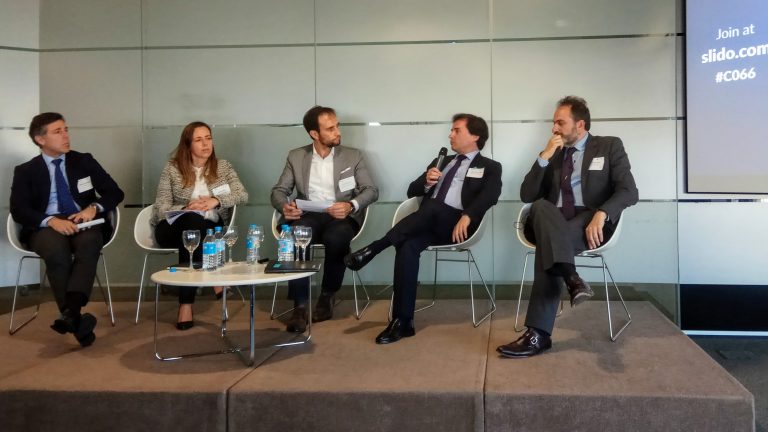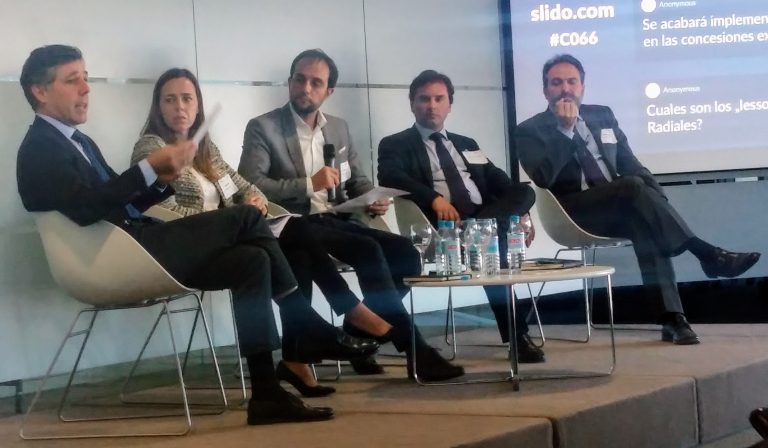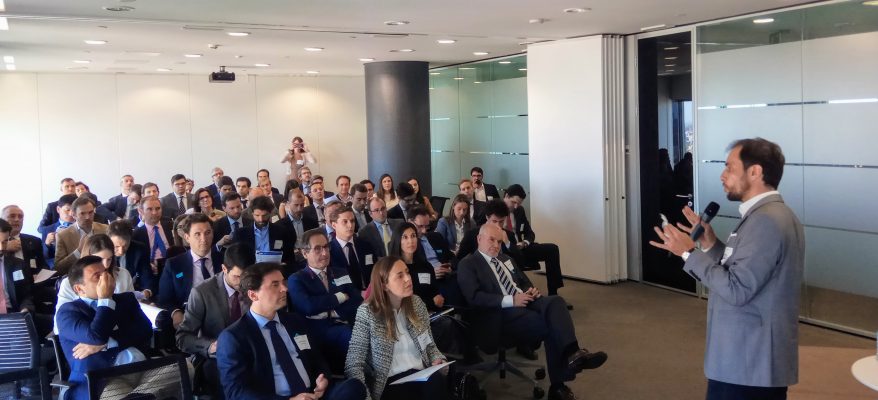This is a Summary of the IPFA event hosted by Solvere Infraestructuras on May 10, 2018. Madrid
This IPFA event organised and hosted by Solvere Infraestructuras intended to create a space for debate and exchange of relevant ideas for public-private partnerships in Spanish roads, with special attention to the Radiales and the new Road Investment Plan (PIC) of the Ministry of Fomento (Public Works).

The venue was at full capacity and counted in approximately 70 professionals who represented broadly the road concessions sector, including the Government, construction companies, road operators, banks, insurers, rating agencies, investment funds and consulting firms.
The starting point was: Road PPPs must have technical and financial sustainability, but also – and no less important – generate long-term value and reinforce the legitimacy of such an infrastructure provision mechanism. This implies a significant change in the culture of the sector, towards greater collaboration and adaptability, innovating in how we work and how we take risks jointly, with greater transparency and boldness in the business approaches.
This spirit was reflected in the interventions of the speakers and attendees, who participated very actively in the debate.
Speakers and Structure of the Session

The session had the following speakers:
- Gonzalo Ortiz, Technical Director, Sociedad Estatal de Infraestructuras del Transporte Terrestre (SEITT)
- Fernando Lacasa, Head of Natural Resources & Infrastructure Iberia, Société Générale
- Nadia Franco, O&M Manager, Acciona Concesiones
- Juan Ruiz de Velasco, CFO, COPASA Concesiones
Jose Cordovilla, Managing Partner of Solvere Infraestructuras acted as moderator. In the first part, SEITT gave an overview of the new PIC and the future tenders for Radiales. SEITT and Société Générale shared their points of view and experiences on different aspects of road PPPs in Spain that were brought to the discussion. In the second part, Acciona and COPASA joined the panel and the debate was opened (as well as the possibility of asking questions) to the rest of the attendees.
Key Topics
Scope of the PIC and Radiales
The Radiales will be tendered as service concessions with total transfer of demand risk and a maximum duration of 25 years in 2 contracts:
- Radiales 2, 3, 4 and 5 together with the AP-36 Ocaña-La Roda, AP-41 Madrid-Toledo and M-12 Eje Aeropuerto
- Circunvalación de Alicante and the AP-7 Cartagena-Vera
The PIC roads will be tendered as public works concessions with a maximum term of 30 years, in 20 projects with investment values between 100 and 400 million euros. Payment mechanism will be availability, to provide commercial appeal to the contracts. The first two projects tendered will be the Murcia ring roads.
The European Investment Bank (EIB) will finance up to 50% of the investments, since they are part of the Trans-European Transport Network.

Commercial attractiveness of the projects
The private sector pointed out that after a number of years (6-7) in which there have been no road concessions in Spain, and the problem of the bankruptcy of Radiales, there is a great interest in the tenders being prepared by Fomento. For the screening of projects, the private sector takes into account the size of the investment (minimum), the bankability, the economic sense of the project, participation of the EIB and other factors. On the other hand, there is strong competition due to the entry of institutional investors.
The Government will establish the contract duration based on the return of investments and market competition, since there must be explicit justification for any duration above the 5-year maximum term established by the new Law on Public Sector Contracts.
Main Risks

An interactive poll used during the event revealed that the main risks for the private sector are the cost / timeframes for land acquisition and demand risk, followed by technological disruption and construction risk. The availability risk and the possible shortage of capable professionals in the sector are considered marginal.
Land Acquisition
In the PIC it seems the proposal will be that the State assume the excess costs of land acquisition between 150% and 250%, but not lower or higher than those thresholds. In the past, the private sector relied on the Responsabilidad Patrimonial de la Administración as a safety net for investments. The problems with the determination of the RPA in Radiales will probably cause the risks to be analysed more meticulously in the future.
Availability Payment
The PIC contract documents will include 15 performance indicators. Given the past experience with availability indicators (complexity in actual management, especially in terms of response times), the structure of indicators has been simplified with respect to previous projects (28 in the case of Benavente-Zamora, 2012) and the General Directorate of Roads will be in charge of monitoring these.
The availability payment for PIC projects will include a deduction in case the demand is lower than expected. The legal services of the Government have determined that, in order to consider the contract as ‘concesión de obras’ -based on the new Law on Public Sector Contracts of 2017- there must be demand risk in addition to availability on the private side, since it is interpreted that the availability – as defined by the existing indicators – does not constitute full transfer of supply risk.
The deduction mechanism that is proposed is up to 10% deduction of the availability fee if the demand drops to 40% of the forecasts, and up to 25% deduction if the drop in demand is 50%*.
*This text was edited to reflect the correct thresholds.
Technological disruption
The feasibility studies of the PIC do not incorporate the possible impact of technological changes such as the autonomous vehicle or MaaS (mobility as a service), since they are considered emerging, untested technologies.
The Radiales contracts and the PIC will only consider the possibility of re-equilibrium due to technological changes in cases where the obligation of new investments or incurring higher costs come from decisions by the contracting administration (i.e. the Ministry of Fomento). This would be the case of updates required as a result of new tunnels safety regulations, but would not apply to new requirements imposed by the Ministry of Industry, for example.

The concessionaire companies are considering innovations such as the monitored highway toward the upcoming tenders, but the experience of innovative initiatives in the past has not been satisfactory and the private sector understands that it has to arise at the request of the Administration.
The event attendees considered that autonomous vehicles, artificial intelligence and mobility as a service are the technologies with the greatest potential for disruption in road PPPs, far beyond new construction materials, electric vehicles or the introduction of open data policies.
Governance
It became obvious the concern of the sector about the social opposition to private participation in infrastructure management, wrongly named “privatisation”. The session saw an interesting discussion about how to strengthen the legitimacy of this public service provision mechanism.
It was highlighted the need for greater efforts in transparency, making more information publicly available on the real figures of roads with private operation, so that the public perceives in a clear way that infrastructures are costly to maintain and operate, and that private participation can bring benefits to the quality of the service.
The discussion also emphasised the importance of dedicating greater efforts and resources to the preparatory stages of the projects, for a better structuring of the PPPs.

Closing of the Session
The event finished with an informative note by Agata Skrzypczak (IPFA European Operations Manager) on the IPFA activities internationally and in Spain, followed by a lively networking drinks reception sponsored by Solvere.

Solvere provides has developed its own methodology for the estimation of contractual and financial risks in complex performance-based and availability payment contracts.
For further information, please contact:
